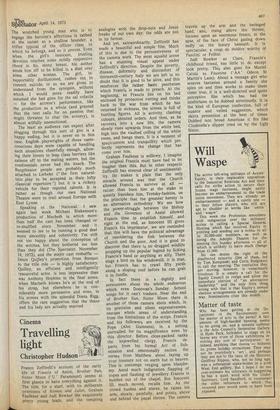Cinema
Travelling light
Christopher Hudson
Franco Zeffirelli's account of the early life of Francis of Assisi, Brother Sun, Sister Moon (' U ' Paramount) seems at first glance to have everything against it. The title, for a start, with its deliberate overtones of Romeo and Juliet, Graham Faulkner and Judi Bowker the exquisitely pretty young leads, and the tempting analogies with the drop-outs and Jesus freaks of our own day: the odds are not in its favour.
And yet, extraordinarily, Zeffirelli has made a beautiful and simple film. Much of this is due to the persuasiveness of the camera work. The most squalid scene has a stunning visual appeal under Zeffirelli's direction. Despite the poverty, disease, deformity and discomfort of thirteenth-century Italy we are left in no doubt that it is good to be alive, and this reinforces the rather basic pantheism which Francis is made to preach. At the beginning, as Francis lies on his bed enclosed by protective petting and thinks back to the war from which he has returned in sickness, the screen is full of bustling figures. All is activity, clashing colours, shouted orders. And then, as he recovers into a new life, the camera slowly rises upwards from the white bed, high into the vaulted ceiling of the white room, and hangs there. It is a moment of spacicusness and tranquillity which perfectly represents the change that has come over him.
Graham Faulkner is willowy; I imagine the original Francis must have had to be tougher than this. But in other respects Zeffirelli has steered clear of sentimentality. He makes it plain that the only miracle around was that the Church allowed Francis to survive at all — rat'iler than burn him at the stake or quietly liquidate him, Trotsky-fashion, on the principle that the greatest heresy is an alternative orthodoxy. We see how the power-struggle between the Bishop and the Governor of Assisi allowed Francis time to establish himself, and right at the end, as Innocent III gives Francis his imprimatur, we are reminded that this will have the political advantage of resoldering the link between the Church and the poor. And it is good to discover that there is no drugged wildlife propping up the popular legend by licking Francis's hand or anything so silly. There sings a bird on his windowsill, it is true, but Francis has to crawl fifty yards • along a sloping roof before he can grab it to fondle.
In fact there is a dignity and seriousness about the whole endeavour which even Donovan's Sunday School songs for it can't traduce. Near the end of Brother Sun, Sister Moon there is another of those camera shots which, in its precision and silent expressiveness, rescues whole areas of understanding from the limitations of the script. Francis and his followers are received by the Pope (Alec Guinness) in a setting unrivalled for its magnificence even by this director. Before close-packed ranks the bejewelled clergy, Francis departs from his formal Act of Submission and emotionally recites the verses from Matthew about laying up your treasure not on earth but in heaven. This is contempt verging upon blasphemy. Amid much indignation flapping of copes and flashing of jewellery Francis is hustled out of the chapel. But Innocent III, much moved, recalls him. As the crowd hushes and stares, he raises his arm, slowly, painfully, and points above and behind the papal throne. The camera travels up the arm and the beringed hand, ano, rising above the throne, focuses upon an enormous fresco, in the apse, of the face of Christ gazing down sadly on the luxury beneath. It is spectacular, a coup de theatre worthy of Pasolini or Fellini.
Judi Bowker as Clare, Francis's childhood friend, has little to do except look pretty. This also goes for Muriel Catala as Faustine (' AA ' Odeon St Martin's Lane). About a teenage girl who weaves fantasies around a family she spies on and then works to make them come true, it is a well-directed and quite perceptive film whicin has had the misfortune to be dubbed atrociously. It is the kind of European confection, full of nuance and veiled suggestion, which skirts pretention at the best of times. Dubbed into broad American it fits like Cinderella's slipper tried on by the Ugly Sister.


































 Previous page
Previous page